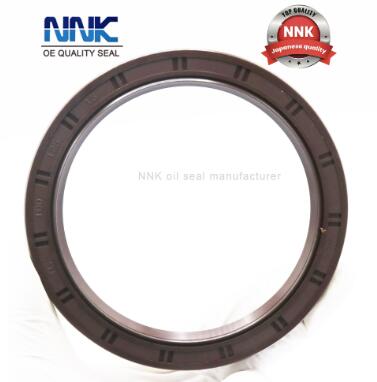Exploring the Significance of Industrial Oil Seals
Jul. 15, 2025
Industrial oil seals play a vital role in various applications across industries, serving as crucial components for preventing fluid leakage and protecting machinery. In this article, we will delve into the topic of industrial oil seals, their importance, and their applications. We will also include personal insights to provide a comprehensive understanding of their significance.
Understanding Industrial Oil Seals:
Industrial oil seals, also known as rotary shaft seals, are specialized devices designed to seal rotating shafts in machinery, preventing the leakage of lubricants and contaminants into or out of the system. They create a barrier between the rotating shaft and the stationary housing, ensuring proper lubrication and operational efficiency of the machinery.
Importance of Industrial Oil Seals:
Leakage Prevention: The primary function of industrial oil seals is to prevent fluid leakage. By creating a reliable seal, they help maintain the integrity of the system and prevent costly damage caused by leaks, such as contamination, loss of lubrication, or reduced efficiency.
Protection Against Contaminants: Industrial environments often contain dust, dirt, moisture, and other contaminants that can adversely affect machinery performance. Oil seals act as a protective barrier, preventing the entry of these contaminants into the system, thereby extending the lifespan of components and reducing maintenance requirements.
Lubricant Retention: Proper lubrication is essential for the smooth operation and longevity of rotating machinery components. Industrial oil seals help retain lubricants within the system, ensuring that critical parts receive adequate lubrication, reducing friction, heat, and wear.
Applications of Industrial Oil Seals:
Industrial oil seals find extensive use in a wide range of applications across industries. Some notable applications include:
Automotive Industry: Industrial oil seals are used in engines, transmissions, axles, and other automotive components to prevent fluid leakage and maintain proper lubrication.
Manufacturing and Machinery: Oil seals are employed in various machinery, such as pumps, compressors, gearboxes, and rotating equipment, where they play a critical role in sealing shafts and maintaining operational efficiency.
Aerospace and Aviation: Industrial oil seals are utilized in aircraft engines, landing gear systems, and other aerospace applications to prevent leakage and ensure the safety and reliability of critical components.
As an industrial oil seal expert, I have witnessed firsthand the significant impact these seals have on the performance and reliability of machinery. The proper selection and installation of high-quality oil seals are crucial to ensure optimal functionality, reduce downtime, and increase the lifespan of equipment. Regular maintenance and monitoring of oil seals are essential to detect early signs of wear or damage and take timely corrective measures.
Industrial oil seals are indispensable components in various industries, playing a vital role in preventing fluid leakage, protecting against contaminants, and maintaining proper lubrication. Their significance extends to automotive, manufacturing, aerospace, and other critical applications. Choosing high-quality oil seals and implementing proper maintenance practices are key to maximizing machinery performance, minimizing downtime, and ensuring long-term operational efficiency. Industrial oil seals are essential elements that contribute to the overall reliability and productivity of industrial systems.

Key Benefits of Oil Seals
Oil seals play a crucial role in various industries by preventing the leakage of fluids and contaminants. These versatile components offer several key benefits that contribute to the smooth operation and longevity of machinery and equipment. In this article, we will explore the essential advantages of oil seals.
Leakage Prevention: The primary function of oil seals is to prevent the leakage of fluids, such as oil or grease. By creating a barrier between moving parts, oil seals ensure that the fluids remain contained within the system, minimizing the risk of fluid loss and potential damage to the equipment. This prevents costly repairs and downtime.
Contaminant Protection: Oil seals also serve as protective barriers against contaminants, such as dust, dirt, and moisture. These external elements can be harmful to machinery, causing abrasion, corrosion, and accelerated wear. Oil seals effectively keep contaminants out, ensuring a cleaner and more efficient operation, and extending the lifespan of the equipment.
Friction Reduction: Another significant benefit of oil seals is their ability to reduce friction between moving parts. By creating a lubricated environment, oil seals minimize the metal-to-metal contact, reducing wear and tear on the components. This leads to smoother operation, increased efficiency, and less energy consumption, ultimately resulting in cost savings.
Temperature and Pressure Resistance: Oil seals are designed to withstand a wide range of temperatures and pressures, depending on the application. They are capable of operating in extreme conditions, ensuring the integrity of the seal and the overall system performance. This versatility makes oil seals suitable for various industries, including automotive, manufacturing, and aerospace.
Versatility: Oil seals come in a variety of sizes, materials, and configurations to accommodate different equipment and operational requirements. They can be custom made to fit specific applications, ensuring a precise and reliable seal. This versatility allows for easy integration into existing systems and provides flexibility in design and manufacturing processes.
Cost-Effectiveness: By preventing leakage, protecting against contaminants, reducing friction, and withstanding harsh conditions, oil seals contribute to cost savings in the long run. The use of oil seals helps decrease maintenance costs, extends the lifespan of machinery, reduces the risk of downtime, and enhances overall operational efficiency.
Oil seals offer significant advantages in terms of leakage prevention, contaminant protection, friction reduction, temperature and pressure resistance, versatility, and cost-effectiveness. These benefits make rubber oil seal components in various industries, ensuring the smooth and reliable operation of machinery and equipment. High-quality oil seals and regularly maintaining them, Can reap the rewards of increased productivity, reduced maintenance expenses, and improved profitability.
28
0
0
All Comments (0)
Previous: best fkm tc oil seal manufacturer
If you are interested in sending in a Guest Blogger Submission,welcome to write for us!


Comments